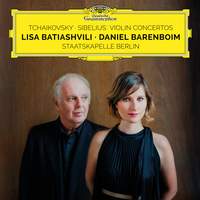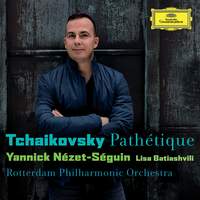Interview,
Lisa Batiashvili on Sibelius and Tchaikovsky
 Released on Deutsche Grammophon in November, Lisa Batiashvili's recording of the Sibelius and Tchaikovsky Violin Concertos with Daniel Barenboim Staatskapelle Berlin hit our desks just as we were finalising the 'Presto Top 100' for 2016, but I think one spin of the disc was all it took to convince us all that it was not only destined for the shortlist but very likely a shoo-in for the Top 10 - reviewing it two weeks later, my colleague James spoke for the whole editorial team in praising the 'freedom and elasticity of phrasing and tempo' which characterise both performances and describing them as 'unbelievably impressive accounts of two cornerstones of the repertoire'.
Released on Deutsche Grammophon in November, Lisa Batiashvili's recording of the Sibelius and Tchaikovsky Violin Concertos with Daniel Barenboim Staatskapelle Berlin hit our desks just as we were finalising the 'Presto Top 100' for 2016, but I think one spin of the disc was all it took to convince us all that it was not only destined for the shortlist but very likely a shoo-in for the Top 10 - reviewing it two weeks later, my colleague James spoke for the whole editorial team in praising the 'freedom and elasticity of phrasing and tempo' which characterise both performances and describing them as 'unbelievably impressive accounts of two cornerstones of the repertoire'.
Shortly after our Top 10 was announced, I had a lovely chat with Lisa over the phone as she prepared for a series of performances in Amsterdam: read on to find out more about her artistic relationship with Daniel Barenboim, her history with these two pinnacles of the concerto repertoire, and the experience of performing them with different orchestras and conductors in quick succession!
The Sibelius concerto is a work that has played a crucial role in your career. Could you tell me a bit about your journey with the piece, and how your thoughts have changed over the twenty-odd years you’ve been playing it?
The piece was initially important because I prepared it and learned it for participation in the Sibelius Competition [in 1995] – that was the first time I performed it in public. Then of course this became a very influential thing in my life: because I came second at this competition, I got to perform a lot in the Scandinavian countries and to meet a lot of great musicians and conductors in Finland, so I basically started my first journey as a concert violinist with this concerto. I was 16 or 17, and I made a lot of important debuts with this piece: so yes, it’s now been about twenty years since I first played it, and there has always been for me a very evident and clear message in the work. It’s like a rhapsody, like a singing voice over this wonderful colour of the orchestra - very emotional, very deep, sometimes very dark - and it tells a lot about the solitude of the human being as well as being very influenced by the nature of the Nordic countries. I think it’s one of the strongest pieces of Sibelius, for sure, because of him loving the violin and himself being a violinist, and somehow really putting extra energy into this concerto.
The booklet notes mention the work that you did on stripping away some of the performance traditions that have accumulated around the Tchaikovsky concerto. Could you tell me a little more about that?
The Tchaikovsky was performed a lot when I was a child (and of course still is!): I remember my time still in the Soviet Union listening to other young violinists, and the Tchaikovsky was the piece that everyone wanted to play, because obviously it’s a very successful violin concerto. And for me it felt a little bit difficult to actually get some distance from all of the influences: everyone was influenced by some great violinist who did things in a certain way, and my ear and my head was full of these kind of specific interpretations. But at the same time I wasn’t yet feeling that I absolutely had to play it: I wanted to wait for the moment when the Tchaikovsky was something I really wanted to do, because I somehow felt that the piece was waiting for me…So I went through all other repertoire, including the twentieth-century stuff (the Bartók concertos, Prokofiev, Shostakovich, the Berg) and of course all the other Romantic concertos, and only then did I decide to turn back to the Tchaikovsky, which I now believe is the most popular and most rewarding violin concerto. And in some ways I wanted to approach it with a blank slate: you look at the music, you pretend you’ve never heard it, and then just go through it and make it yours without any kind of influences. Maestro Barenboim helped me a lot with that because he seemed to want exactly the same thing with this piece: it’s a concerto that has been played so much and in so many different ways and had so much sugar added to it, so he said, “Let’s purify it a bit!”. Somehow the first time we played together it was so easy and so obvious that we just felt it was the right thing to go and make a recording!
You’ve performed a lot together over the last few years - how did your relationship evolve?
The first time I performed with Maestro Barenboim was about four years ago, and from then on it was very intense, because he had just kept inviting me for more projects! I think it’s part of his style: he’s an incredibly devoted supporter of certain musicians he likes to work with, and then one keeps in touch with him on a regular basis; during the last four years we’ve performed all sorts of different repertoire, including the major violin concertos like the Beethoven, Brahms, Tchaikovsky, Sibelius. We’ve done so much together and it was an amazing moment for me to meet someone like this at this time of my life: suddenly I get to be in touch and talk and make music with someone who is almost a living legend, and who has so much to say as a musician but also as a person.
You have quite a few performances of this piece coming up around Europe, first with Barenboim, then with Antonio Pappano and then with Gustavo Dudamel. How different do you think those experiences will be – what qualities will each of these conductors bring to the piece?
I am very spoilt to be working with three amazing conductors, basically on a weekly basis! They are all very different: sometimes it’s a difference of the generation, a difference of the tradition, of the culture they come from. I imagine for example that the performance with Dudamel will probably be very energetic and very brilliant, and with Pappano it’s something incredibly profound and very deep (he and I have also worked on the Sibelius, by the way). The question is how to keep a sense of your own interpretation whilst allowing yourself to be influenced by such great musicians: it’s actually quite fun to get inspired and try out something a little bit different, but at the same time to stay as much as possible with what you feel is right. For example the tempi – everyone is so different, some people want to play faster and more energetic, and others take a little bit of time, and for me it has always been a question of how to balance it together. I think that on the highest level of music making, it’s not about me coming and doing my thing and asking them to follow me, it’s really about exchange and ideas, but at the same time I have to be faithful to myself and to what I see – and that’s always a nice challenge, because you see who you want to work with for the rest of your life. You find yourself somewhere in the middle where two personalities (or more) give something extra to this piece of music that you’re performing and then it becomes really a matter of the momentum, which is I think our goal.
I notice you recorded some of the Tchaikovsky song transcriptions a couple of years ago, with Yannick Nézet-Séguin. Do you feel there are any parallels between those miniatures and what happens in the concerto?
Certainly Tchaikovsky’s biggest strength was to write such beautiful themes and melodies: I think, for example, that the second theme of the first movement [of the Concerto] is certainly like a romance, as is the second movement. If you think of all the things he worked on, like the Romeo and Juliet theme, or the Symphonie Pathétique (especially the slow movement), the face of Tchaikovsky’s music is all about these very simple, very honest and incredibly beautiful melodies which become what in Germany we call an “Ohrwurm” [‘ear-worm’!]: you can’t stop singing them to yourself! So for me that is the most beautiful part of the world: if you do something simple, something straightforward and at the same time really touching.
Do you have any other recording plans which you can share with us yet?
I do, yes! We are just planning it and all I can say is that it’s going to be with a very, very special orchestra… It’s something I’ve been wanting to accomplish for many years and it’s been very difficult for many reasons - but now I’m just about to make it happen, and the connection is one of my closest musical friends, so I think it’ll be another project that will mean a lot to me as a person as well.
Lisa Batiashvili's recording of the Sibelius and Tchaikovsky concertos with Daniel Barenboim and the Staatskapelle Berlin was released on Deutsche Grammophon last month, and is part of our Discs of the Year promotion which runs until the end of January.
Available Formats: CD, MP3, FLAC, Hi-Res FLAC
Lisa Batiashvili (violin); Rotterdam Philharmonic Orchestra, Yannick Nezet-Seguin
Available Formats: MP3, FLAC, Hi-Res FLAC




